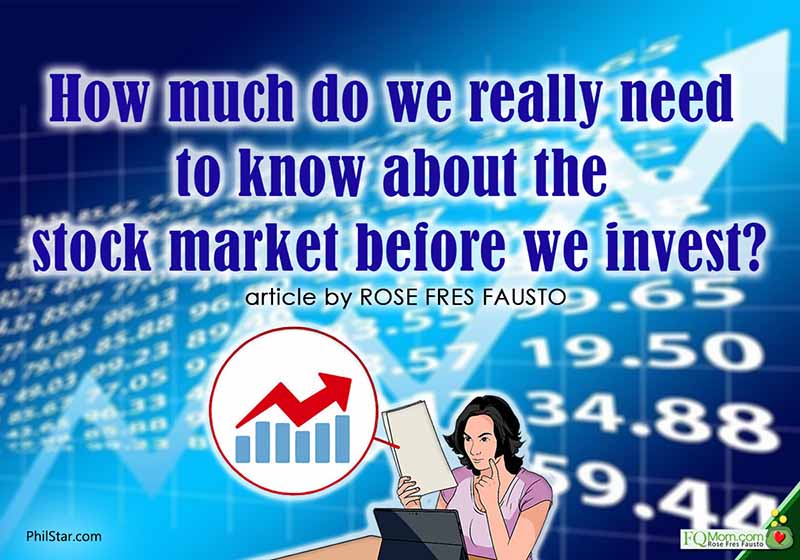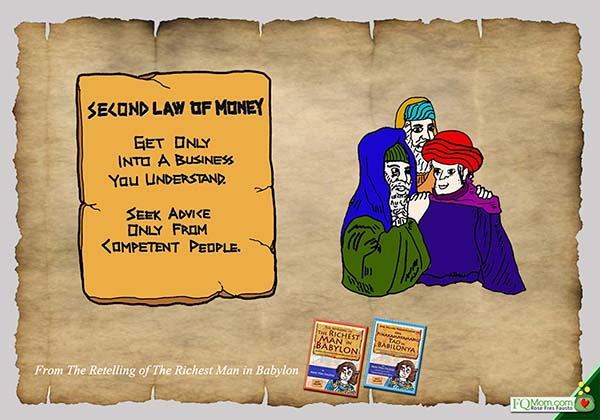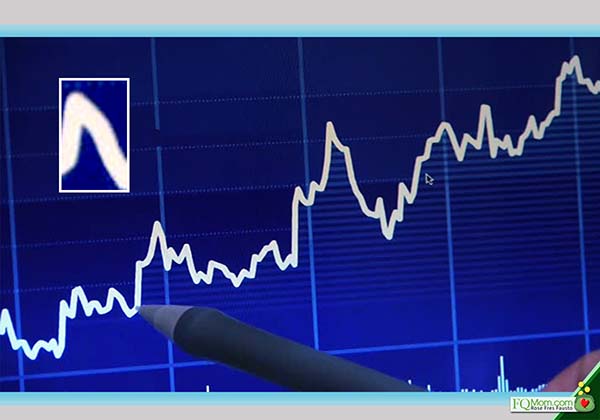How much do we really need to know about the stock market before we invest?


Investing in the stock market should be viewed as being in partnership with the owners of listed companies.
Last Wednesday, I attended the event dubbed “A Night with Wilson Sy,” a fund raising project by Xavier School batch 1993 headed by John Sy and Cesar Wee. Proceeds of the event goes to the foundation for their alma mater’s teachers whom they fondly call “Cher.” I know this term of endearment because two of my three sons graduated from Xavier.
It was an evening of learning from one of the best fund managers in the country. He shared a bit of his life story, his early years in the stock market, the bears and bulls he experienced in his four decades of being in the market (Click link to read more about Wilson Sy). His final prognosis of the market is that we are in the longest and strongest bull run in our history. It started on March 6, 2009 making it eight years and eight months old with no signs of stopping anytime soon. Yes, there will be pullbacks and corrections but he advised us to stay invested and to remember that this bull run is underpinned by broad based economic global growth, low interest rates, rising corporate earnings and a global equities bull run (To read more on this click Let It Go).

Right: Wilson Sy presenting; Top left: The author with the guest of honor who’s a Xavier graduate, the author’s sons who are also Xavier graduates Enrique Fausto (XS 2011) and Martin Fausto (XS 2008); Bottom left: Xavier batch 1993 John Sy and Cesar Wee.
To someone who is already investing in the market or someone who has a keen interest in the market, all the factors discussed by Mr. Sy make sense, sound exciting, enough to nudge him to start investing or to stay invested in the market. But how about the regular Juan who may find stock market talk too intimidating? Should we insist on that prudent advice “Invest only in the stock market after you fully understand how it works?” If we subject all Filipinos to a quiz on how the stock market works, how many would pass? I bet way too few. In fact, if it’s any indication, only a miniscule less than 1 percent of our population is invested in the stock market.
Here’s the thing. How come we have more than 100 percent penetration rate in mobile phones? How come we have around 47 million active Facebook users and that our country is the fastest growing app market in Southeast Asia? How much did we need to know about how the cellphone and the internet work before we started using them and availed of their benefits? The answer is just enough. It’s the same with television, radio, etc. We didn’t have to know the nitty gritty of how they work before we started using them.
So maybe we should have the same attitude towards the stock market.
What is enough knowledge of the market that we should possess before we start investing in it?
Here are the basic matters that we should understand before we invest in the market:
1. What is the stock market? To put it simply, it is a place where shares of stock of listed companies can be bought and sold. Before a company can list its shares of stock in the stock exchange, it goes through a screening process in order to protect the investing public. The buying and selling transactions are done through stock brokers accredited by the exchange.
2. You are in partnership with the owners of the listed companies. Once you purchase shares, you become partners with the owners of listed companies (e.g. the Sys of SM Group, the Zobels of Ayala companies, et. al). Because you are now part owners of these companies, you share in their profits through cash dividends. You also participate in the appreciation of the value of these companies. Since you are an owner, you also take your share of the risks in these companies; your returns on investments are not assured.

Investing in the stock market should be viewed as being in partnership with the owners of listed companies.
3. You can easily buy and sell companies through the stock market. If you want to buy a certain number of shares in let’s say SM Prime Holdings (SMPH) or Ayala Land Inc. (ALI), you can do so through your broker. You can do it yourself if you have an online brokerage account. If you want to sell said shares, you may also do so with the click of your mouse, no questions asked. No hard feelings from the Sys and Zobels when you sell their companies. Compare this with getting into a business either on your own, or with partners who are your friends or relatives. Before you can put up a company, you have to secure all the necessary permits, have a business plan, sufficient capital, trained staff, and so on. When you want to get rid of this investment, there’s a lot of winding down that you have to do before you can liquidate your investment.

No hard feelings from the Sys and Zobels even if you sell their shares.
4. Are you better than the taipans? We all want to grow our money and getting into business is one of the ways to do it. But how many among us are better than the ones who run the listed companies? Think about it. I am all for encouraging entrepreneurship, but let’s be prudent when we do this. A friend who has been in the food business for decades expressed this concern, “The problem with food parks now is that a lot of kids who get free capital from their parents just get into the business without knowing and loving the business enough. And that is why we see a lot of food stalls come and go these days.” Remember the second basic law of money: Get only into a business that you understand, and seek advice only from competent people. (Click link) For the meantime, your money is better off invested with the business experts through the stock market.

When you get into a business, please remember the second law of money.
5. The truth behind stock price fluctuations. One of the reasons why many people don’t invest in the stock market is that they don’t have the stomach to take in the fluctuations in the value of their investment everyday, every minute of a trading day. They would rather have their money invested in fixed income instruments, never mind the prevailing low rates. There are many reasons why stock prices move up and down, and most of them do not have anything to do with the value of the underlying company, but with the emotions of the people in the market – i.e. the predictably irrational humans. Or they would rather put their money in their own business because of that inaccurate sense of value control. Here’s something that’s overlooked. If you invest on your own or with friend or relative partners, the value of your investment also fluctuates. As soon as you put in your hard earned cash in the business, as soon as you start buying your equipment, inventories, etc., the value of your investment changes. And it changes everyday depending on the direction of your business. The only difference is that there is no ready market that shows its value the way the stock market does. Try it, ask someone how much he’s willing to buy your business for.
6. Yes, active trading can be exciting but… A lot of people who got burned in the market are those who got into it based on a hot tip, expecting a quick return as boasted by their friends, only to lose their hard earned money. Indeed, humans are not very different from the moth in the story narrated by Jose Rizal’s mom to him. A lot are easily lured to the hype created by stock traders, only to end up with the empty bag when the music stops. Yes, there are good traders but they are very few of them. In fact, most of the successful active traders I personally know own their brokerage firms where they trade. So a great part of their returns comes from the fact that their buy and sell commissions accrue to the same pocket anyway. Besides, active trading needs extensive training, discipline and a certain temperament to be successful. You cannot get this through Facebook chats you insert in your day job when your boss is not looking.
7. What if stock picking is still difficult? And the answer is yes, even this long term hold stock picking still needs your ability to read annual reports, financial statements, understand management philosophies, etc. But again, just like how you didn’t need to understand how Mark Zuckerberg set up Facebook in order to use it, it is not a pre-requisite to know stock picking in order to avail of the returns of the stock market. Just buy equity funds managed by the experts. In fact, buy equity index funds and you’d be better off than trying to come up with your own portfolio haphazardly.

You are better off investing in low cost index funds than picking your stocks haphazardly.
8. The market is bound to go up and down. If you just understand and embrace that stock market, even a bull run at that, does not move in a neat straight line, then you are fine. I like to use my son Enrique’s analogy of zooming out. When we immerse ourselves in the daily gyrations of the market, we are likely to panic and sell when the market goes down, and likely to buy when the market is irrationally exuberant (the very opposite of what we should do). So in looking at market movements, try to zoom out so you can see the uptrend. For our long-term investments, we are better off to heed “Keep calm and continue investing” preferably automatically so we take out the emotional factor. (Click link to know the emotional cycle of investing.) If we feel that we really suffer from myopic loss aversion, then we are better off heeding Vanguard founder John Bogle’s advice, “Don’t peek! don’t peek! Don’t peek!” (Click link to read more on Myopic Loss Aversion.)

You may get jittery if you focus on the daily fluctuations, but if you zoom out the market has an upward trend.
What we should all remember is that everybody needs long term money – from the richest in the Forbes list to the poorest worker in the province, and the stock market provides the highest returns in the long run. It is just right that we should all be invested in the market as early as we can, and on a regular basis.
This is not an easy task to do and so there has to be a design that should be implemented. We should implement said design not just for our own nest egg, but also for the people within our circle of responsibility - the people we care for, the people who work for us, and those who look up to us for guidance. This will be discussed in future articles. ![]()
*******************************
ANNOUNCEMENTS
1. I will be the moderator of a segment at the Blogapalooza’s annual event, this time entitled Generation D (as in Digital). This will be on Nov. 18, 2017 at the City of Dreams from 10 a.m. to 7 p.m. My segment with these four digital influencers will be at 2:45 to 3:45 p.m. I hope to see you there.

2. Want to know your FQ score? Take it today. Click link to take the test. http://tinyurl.com/FQTest

Rose Fres Fausto is a speaker and author of bestselling books "Raising Pinoy Boys" and "The Retelling of The Richest Man in Babylon" (English and Filipino versions). Click this link to read samples – Books of FQ Mom Rose. She is a behavioral economist, a certified gallup strengths coach and the grand prize winner of the first Sinag Financial Literacy Digital Journalism Awards. Follow her on Facebook and You Tube as FQ Mom, and Twitter & Instagram as theFQMom.



















